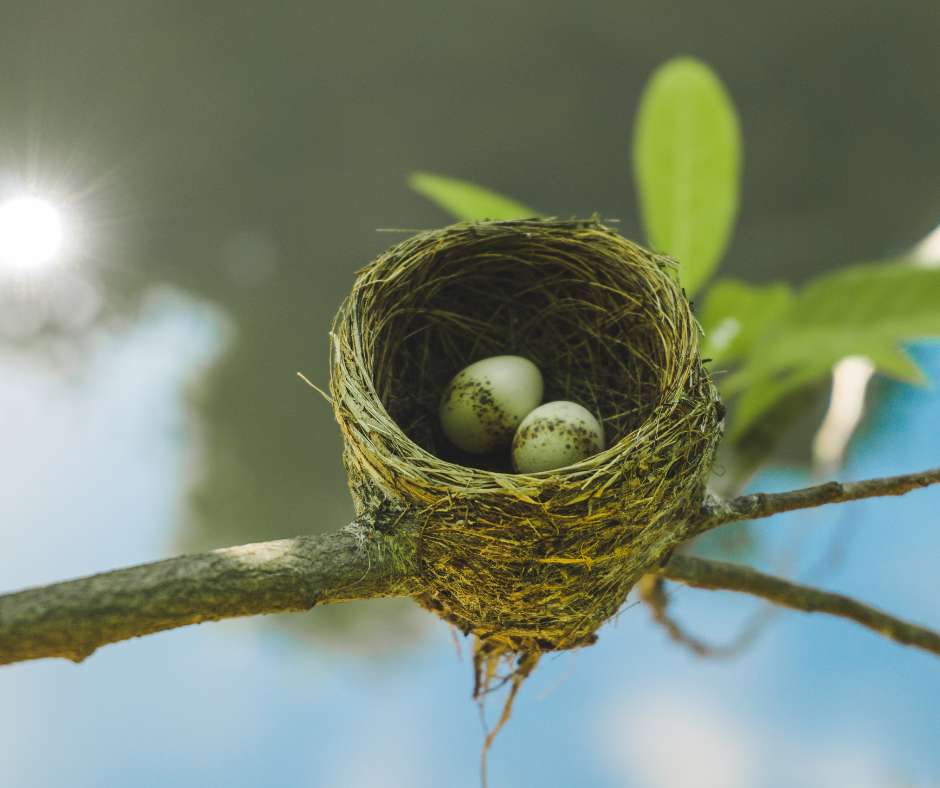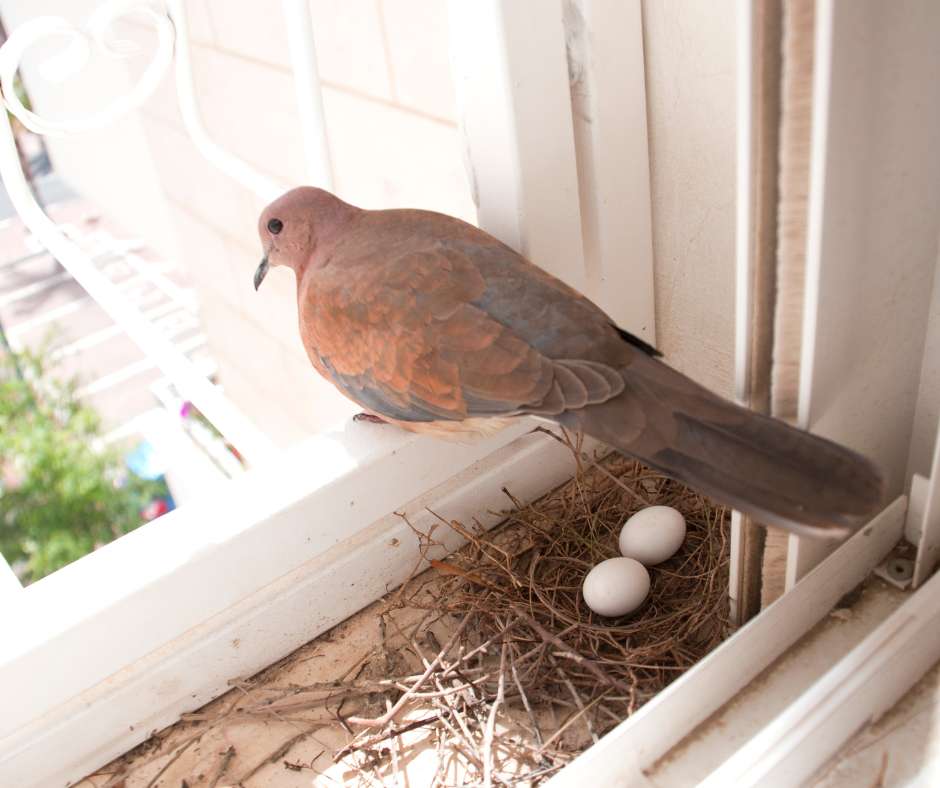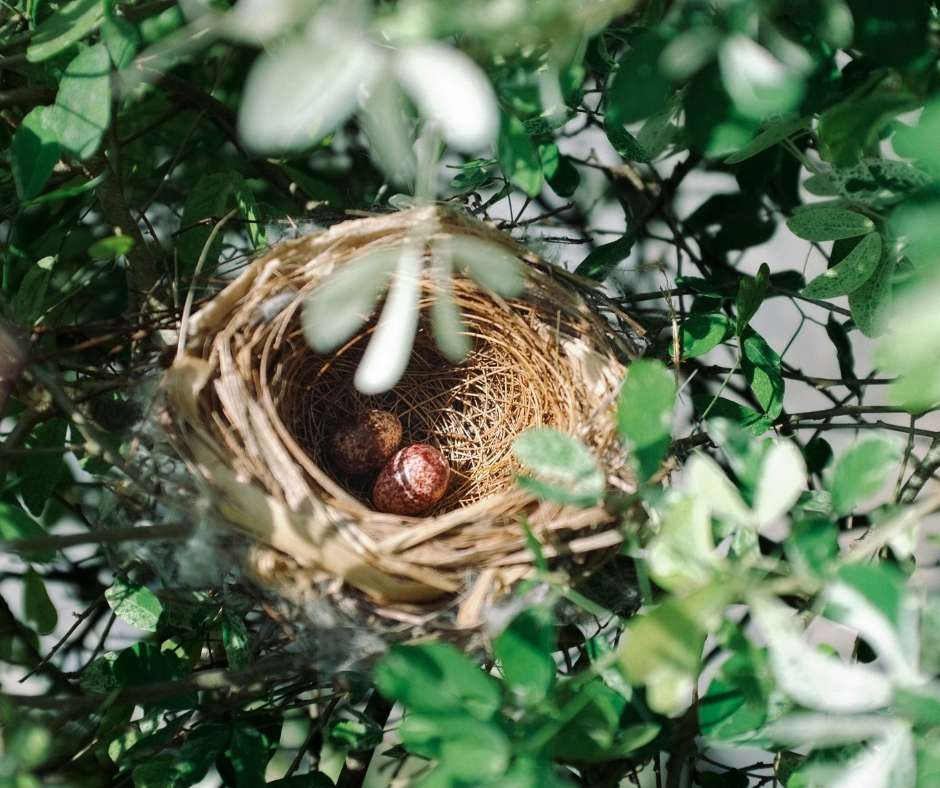Birds and their nests are a marvel of nature, but have you ever wondered, can birds move their eggs? It’s an excellent question that takes us into the world of birds and how they take care of their eggs.
In this blog, we’ll look at all kinds of bird nests. You’ll learn about birds like ducks and plovers that move their eggs to safe places and about birds like robins and mourning doves that keep their eggs in one spot.
We’ll talk about why they do this, what can go wrong, and clear up some myths, too. Join us to learn about how birds look after their eggs!
Understanding Bird Nesting Habits
Birds are master builders when it comes to creating nests for their eggs. Each species has its unique way of making these cozy homes. Some, like eagles, build massive nests high up in trees, while others, such as penguins, don’t use nests and keep their eggs on their feet to stay warm!
How birds build their nests depends on where they live, the materials they can find, and the dangers they need to protect their eggs from. Whether it’s a simple scrape on the ground or an intricate nest of twigs and leaves, each nest is a special place for birds to take care of their eggs and, later, their chicks.
This variety in nesting habits shows how clever and adaptable birds are in caring for their families.

Can Birds Move Their Eggs? An Overview
Yes, some birds can move their eggs. This skill varies across species. Birds like ducks and plovers gently roll their eggs with their beaks to shift them within the nest or to a safer spot. However, not all birds can do this.
For example, downy woodpecker and many tree-nesting birds don’t have the ability to move their eggs. They rely more on choosing safe nest locations and protecting their eggs from dangers like predators.
This ability to move eggs is a clever adaptation that helps certain birds respond to threats or changing environmental conditions, ensuring their eggs stay safe until they hatch.
Detailed Exploration of Egg-Moving Behaviors
In this section, we discover how birds, from plovers to swans, ingeniously move their eggs using beaks or feet. We also learn about doves, pigeons, Brush Turkeys, and Grebes, each with unique strategies for egg relocation in response to environmental challenges, ensuring the survival and safety of their future chicks.
How Birds Physically Move Their Eggs
Birds like plovers and ducks move their eggs by gently nudging them with their beaks. This careful rolling lets them rearrange eggs in the nest or move them to safer spots. Larger birds, such as swans, may use their feet to reposition their eggs, showcasing different methods based on their size and nest type.
Species That Are Known to Move Their Eggs
Doves and pigeons are known for their ability to shift eggs within their nests using their beaks. Unique to Australia, Brush Turkeys rearrange eggs in their large mound nests to regulate temperature.
Grebes, aquatic birds, build floating nests and often adjust their eggs in response to water movements. Flamingos also reposition eggs on their mud mound nests to protect them from water.

Egg Relocation Distances and Strategies
The distance a bird moves its eggs varies. Ground-nesting birds might roll eggs a short distance to avoid flooding or predators. Some, like the Guira cuckoo, use a unique strategy of carrying eggs to shared nests for communal incubation. These behaviors show how birds adapt their egg-moving strategies to their environments and survival needs.
Reasons Behind Egg Movement
Let’s move on to understanding the reasons why birds move their eggs. This includes protecting them from predators and harsh weather, adapting to changes in their habitat, and maintaining the ideal temperature and cleanliness of the nest.
These actions are vital for their chicks’ survival and healthy growth, showcasing the birds’ incredible adaptability and nurturing instincts.
Protection from Predators and Environmental Threats
Birds often move their eggs to protect them from dangers like snakes or lousy weather. They’ll carefully relocate their eggs to a safer spot if they sense a threat. This intelligent move keeps their future chicks away from harm’s reach, increasing their chances of survival.
Adapting to Habitat Changes and Limited Nesting Spaces
Sometimes, a bird’s home area changes, maybe because of humans building things or natural events like floods. When this happens, birds might move their eggs to find a safer place with enough food and shelter. This adaptability is crucial to their survival in a constantly changing environment.
Temperature Control and Nest Maintenance
Keeping the eggs at the right temperature is crucial for the chicks to develop correctly. Birds might move their eggs to warmer or cooler spots in the nest. They also move eggs to keep the nest clean and comfy, removing broken shells or unwanted materials.
Risks and Challenges in Moving Eggs
Moving eggs is challenging for birds; it’s a risky task. Bird eggs are very fragile, so there’s always a chance they might crack or break when being moved. It can be sad news, as the baby bird inside might not survive.
Also, moving eggs around can disturb the little chicks growing inside, which isn’t suitable for their development. Another challenge birds face is returning to the same nest after moving the eggs.
If they get lost or can’t find their way back, the eggs might be left alone without the necessary warmth and protection. So, while moving eggs can be helpful, it also comes with dangers and difficulties.

Egg Myths Uncovered: What’s True and What’s Not
In the world of birds, some myths aren’t true. One myth is that bird eggs can roll around on their own. In reality, eggs don’t move by themselves; the parent birds carefully adjust them. They use their bodies or beaks to ensure the eggs are in the right spot, keeping them safe and warm.
Another common myth is that all bird eggs need to be constantly turned. While some birds, like chickens, turn their eggs regularly, not all do this. Each bird species has its way of looking after their eggs, and nature has ensured they know precisely what to do.
So, these myths might sound interesting, but they need to tell the real story of how birds care for their eggs.
Nesting Behaviors Across Different Bird Species
In this section, we’ll dive into the fascinating nesting habits of birds. From ducks cleverly rolling their eggs for safety to robins picking just the right spot for their nests, each bird has its unique way of ensuring their little ones hatch safely. Let’s explore these fantastic survival strategies!
Variations in Nesting
Birds That Move Their Eggs
Ducks and Plovers: These birds use their beaks to roll their eggs gently to safer spots.
Brush Turkeys: They rearrange eggs in their mound nests for temperature control.
Birds That Don’t Move Their Eggs
Robins: They keep their eggs in one place, focusing on choosing safe nest locations.
Mourning Doves: Known for their stationary approach, they do not move their eggs after laying.
Egg Movement Implications
Moving eggs isn’t only about moving them from one place to another; it’s about keeping them safe. Birds like ducks and plovers move their eggs to save them from danger, like predators or bad weather.
It makes it more likely that their eggs will hatch. But birds like robins and mourning doves don’t move their eggs. Instead, they pick safe places for their nests from the start. Each bird has its way of ensuring its eggs are safe. All these ways help birds take good care of their eggs and ensure their little chicks can grow up.
People Also Asked
Can birds move their babies to a new nest?
Generally, birds don’t move their babies to new nests. Once the nest is made and the eggs are laid, that’s where the babies will stay. Moving babies is risky and rare. However, there are a few exceptions where some bird species might relocate their chicks under extreme circumstances, but it’s not typical behavior.
Do Robins ever move their eggs?
Robins typically do not move their eggs once they have been laid. They spend a lot of time choosing a safe and suitable location for their nest to ensure the safety of their eggs. So, they rely on the security of the selected nest location rather than moving the eggs.
Can mourning doves move their eggs?
Mourning doves do not move their eggs after laying them. Like robins, they select a secure and hidden spot for their nest to keep the eggs safe. Once the eggs are laid, they remain in that spot until they hatch.
Do wrens move their eggs?
Wrens, in general, don’t move their eggs. They are known for their skill in building well-hidden and safe nests in various locations, from tree holes to shrubbery. This careful selection of nesting sites reduces the need to move their eggs to protect them from predators or environmental hazards.
Wrap Up
We learn that some birds, like ducks, can move their eggs by rolling them to keep them safe. Other birds, like robins, don’t move their eggs but choose safe places for their nests. Every bird has its unique way of looking after its eggs. Learning about this helps us see how amazing birds are and why we should care for them and their homes.






